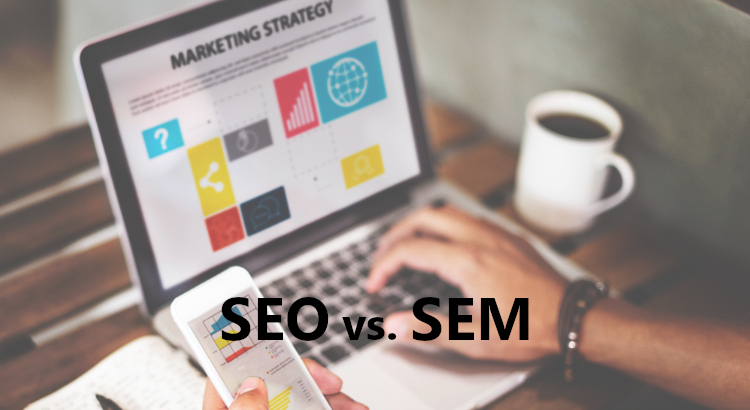Achieving online visibility is important for businesses. Two fundamental strategies, SEO and SEM, play pivotal roles. Understanding their differences, benefits, and considerations is crucial for making informed decisions that align with your business goals.
Seeking guidance from a reputable digital marketing company can help you effectively implement both SEO and SEM services to maximize your online presence.
SEO vs. SEM: Overview and Main Features
1. What is SEO?
Search Engine Optimization (SEO) is a multifaceted approach aimed at enhancing a website’s visibility on search engines. It comprises various components, each contributing to improved search rankings.
Read More: SEO Basics: A Beginner’s Guide to Getting Started
On-page SEO:
On-page SEO focuses on optimizing elements directly within the website, such as content, meta tags, and HTML code. This ensures that each page is structured and formatted to be easily understood by search engines.
Off-page SEO:
Off-page SEO involves strategies implemented outside the website to improve its online authority. This includes building high-quality backlinks, social media engagement, and other external factors influencing the site’s reputation.
Technical SEO:
Technical SEO involves optimizing the website’s infrastructure and backend elements. This includes improving site speed, enhancing mobile responsiveness, and ensuring proper indexing by search engines.
2. What is SEM?
Search Engine Marketing (SEM) is a digital marketing strategy that utilizes PPC advertising to increase a website’s visibility on search engine results pages (SERPs). It involves various techniques to attract immediate attention. Google Ads and Bing Ads are examples of popular SEM platforms.
Related Article: Ways to Maximize Brand Awareness Through Paid Search
SEO vs. SEM: What’s the Difference?
SEO and SEM differ in approach and outcomes. SEO focuses on organic strategies to improve search rankings, while SEM incorporates paid advertising for immediate visibility. Balancing both ensures a comprehensive digital marketing strategy.
SEM vs. SEO: What are the Similarities?
- Improve the Visibility of Your Website: Both SEM and SEO aim to enhance a website’s visibility on search engine results pages (SERPs), making it more likely for users to discover and click on your content.
- Drive a Higher Amount of Relevant and Quality Traffic: Both strategies focus on attracting targeted traffic to your website. Whether through paid advertisements or organic search results, the goal is to bring in users genuinely interested in your products or services.
- Help You Gain a Deeper Understanding of Your Audience: Both SEM and SEO involve analyzing user behavior, preferences, and interactions. This data provides valuable insights into your audience’s preferences, allowing you to tailor your strategies for better engagement.
- Use Keyword Research to Discover and Target Relevant Keywords: Both SEM and SEO rely on thorough keyword research to identify terms and phrases relevant to your business. This ensures that your content aligns with user search queries, increasing the likelihood of visibility and engagement.
- Require Ongoing Testing and Optimization: Both SEM and SEO strategies are dynamic and require continuous monitoring, testing, and optimization. Adapting to changes in user behavior, search engine algorithms, and industry trends is essential for sustained success in both approaches.
SEO vs. SEM: How Much Do They Cost?
The cost of SEO and SEM varies based on factors such as competitiveness, industry, and business goals. SEO generally involves ongoing efforts, making it a long-term investment, while SEM costs are more immediate and can be adjusted based on ad spend and campaign settings. Both strategies offer flexibility in budget allocation to suit different business needs.
SEO vs. SEM: How Long Does It Take to See Results?
SEO is a long-term strategy, often taking months for significant results. In contrast, SEM, with paid advertising, can yield immediate visibility and traffic. The timeframe for results depends on the specific goals and tactics employed.
SEO vs. SEM: Which Should You Use?
The choice between SEO and SEM depends on your business objectives, budget, and timeline. SEO builds sustainable, long-term visibility, while SEM delivers instant results, making them complementary strategies for a comprehensive digital marketing approach. Utilizing both together strategically can enhance your overall online presence and yield better results.
Conclusion of SEO vs. SEM
In the SEO vs. SEM debate, there is not a universally applicable solution. A balanced strategy that incorporates both approaches can provide the best of both worlds. SEO establishes a strong foundation for organic growth, while SEM offers agility and immediate visibility.
Frequently Asked Questions
Can I use both SEO and SEM for my business?
Yes. Combining both strategies ensures a holistic approach, leveraging the strengths of each. SEO builds sustainable, long-term visibility, while SEM offers quick results, creating a comprehensive digital marketing strategy for optimal online success.
How do I determine the right budget for SEM?
Assess your business goals, competition, and target audience. Begin with smaller budgets, gradually increasing based on performance. Regularly analyze metrics to optimize spending for effective SEM campaigns tailored to your business needs.
Learn More: PPC Budgeting: How Much Should You Really Spend?
Is SEO or SEM better for long-term results?
SEO is ideal for sustainable, long-term growth, establishing your website as an authoritative source. SEM, while providing immediate visibility, is best used in conjunction with SEO for a balanced strategy that maximizes overall digital marketing success.
Do I need to constantly update SEO strategies?
Yes, SEO requires ongoing efforts to adapt to changing algorithms, industry trends, and evolving user behavior. Regular updates and adjustments ensure your website maintains visibility and relevance, contributing to sustained success in the competitive online landscape.
Can I start with SEM and later shift to SEO
Yes, many businesses initially invest in SEM for immediate visibility and traffic. As your online presence matures, gradually incorporating SEO ensures sustained, organic growth. This strategic transition optimizes long-term success in the digital space.


